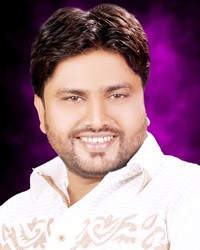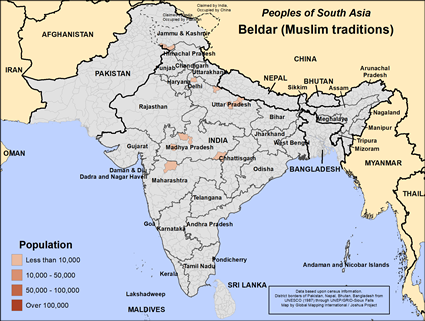Their name Beldar means a person who digs in the ground. Thus, it is easy to understand that there are many in the Beldar caste who labor in excavating work. Because they do manual labor, they have low status in Indian society. The Beldar are part of the Sudras, the fourth level of Hindu caste system.
The main two languages of the Beldar peoples are Kannada, but the Muslim Beldar usually speak Urdu.
Muslim Beldar are employed in agricultural work and in construction. They are able to maintain relationships with members of other communities, sharing water sources and religious shrines. The Beldar marry within their caste. Marriage with paternal or maternal relatives is avoided. Sons inherit their father's property with the eldest son becoming the head of the family. Caste councils settle legal disputes and promote their interests. Many of the Beldar, especially their women, are unable to read or write.
Their main foods are rice, wheat, millet, vegetables and fruit. Meat is often eaten only on special occasions due to the poverty of many Beldar families.
Though most Beldars are Hindu, there is a sizable Sunni Muslim minority among them. Sunni Muslims believe that the supreme God, Allah, spoke through his prophet, Mohammed, and taught mankind how to live a righteous life through the Koran and the Hadith. To live a righteous life, you must utter the Shahada (a statement of faith), pray five times a day facing Mecca, fast from sunup to sundown during the month of Ramadan, give alms to the poor, and make a pilgrimage to Mecca if you have the means. Muslims are prohibited from drinking alcohol, eating pork, gambling, stealing, slandering and making idols. They gather for corporate prayer on Friday afternoons at a mosque, their place of worship.
The two main holidays for Sunni Muslims are Eid al Fitr, the breaking of the monthly fast and Eid al Adha, the celebration of Abraham's willingness to sacrifice his son to Allah.
Sunni religious practices are staid and simple. They believe that Allah has pre-determined our fates; they minimize free will.
In most of the Muslim world, people depend on the spirit world for their daily needs since they regard Allah as too distant. Allah may determine their eternal salvation, but the spirits determine how well we live in our daily lives. For that reason, they must appease the spirits. They often use charms and amulets to help them with spiritual forces.
The Beldar need help in learning new job skills. They need help in educating their children. Many rural Beldar do not have access to clean water, electricity and indoor plumbing. Most of all, the Beldar need to hear and understand the life-changing message of Jesus Christ. He alone can forgive their sins and give them new life.
Pray for a chain reaction of Beldar families reaching families that results in thousands of new believers who share their faith with others.
Pray that churches and believers will bless their entire people group in such a way that God's love will change them like yeast changes dough.
Scripture Prayers for the Beldar (Muslim traditions) in India.
https://en.wikipedia.org/wiki/Beldar
| Profile Source: Joshua Project |











